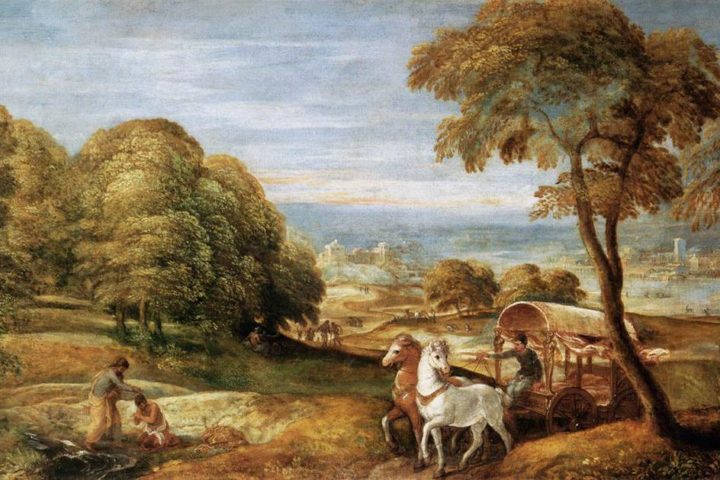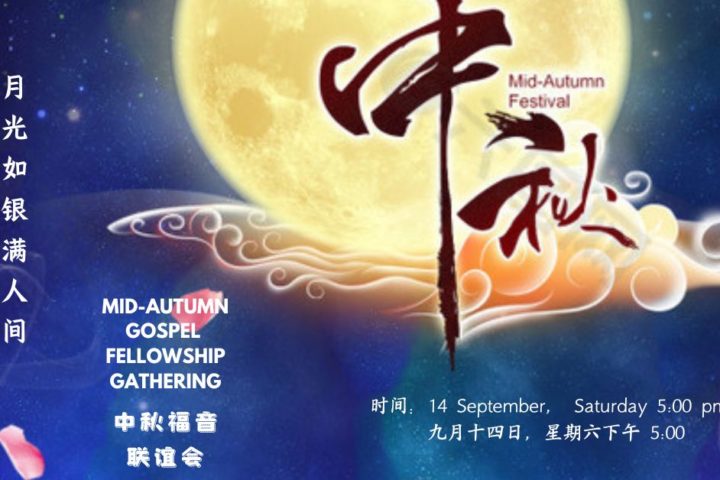Centerfold Articles 主日刊文章 (Page 17)
Lessons from Ethiopian Eunuch’s Conversion
Lessons from Ethiopian Eunuch’s Conversion From the desk of Rev Tay 13 October 2024 Acts 8:26-39: 26But an angel of the Lord said to Philip, “Rise and go toward the south to the road that goes down from Jerusalem to Gaza.” This is a desert road. 27And he rose and went. And behold, an Ethiopian, a eunuch, a minister of the Can′dace, queen of the Ethiopians, in charge of all her treasure, had come to Jerusalem to worship…
埃塞尔比亚太监得救的功课
埃塞尔比亚太监得救的功课 郑牧师摘写2024年10月13日 《使徒行传》8:26-39: 26 有主的一个使者对腓利说:「起来,向南走,往那从耶路撒冷下加沙的路上去!」那路是旷野。 27 腓利就起身去了。不料,有一个埃塞俄比亚人,是个有大权的太监,在埃塞俄比亚女王干大基的手下总管银库。他上耶路撒冷礼拜去了, 28 现在回来,在车上坐着,念先知以赛亚的书。 29 圣灵对腓利说:「你去,贴近那车走!」 30 腓利就跑到太监那里,听见他念先知以赛亚的书,便问他说:「你所念的你明白吗?」 31 他说:「没有人指教我,怎能明白呢?」于是请腓利上车与他同坐。 32 他所念的那段经说:「他像羊被牵到宰杀之地,又像羊羔在剪毛的人手下无声,他也是这样不开口。 33 他卑微的时候,人不按公义审判他。谁能述说他的世代?因为他的生命从地上夺去。」 34 太监对腓利说:「请问,先知说这话是指着谁?是指着自己呢,是指着别人呢?」 35 腓利就开口从这经上起,对他传讲耶稣。 36 二人正往前走,到了有水的地方,太监说:「看哪,这里有水!我受洗有什么妨碍呢?」 38 于是吩咐车站住,腓利和太监二人同下水里去,腓利就给他施洗。 39 从水里上来,主的灵把腓利提了去。太监也不再见他了,就欢欢喜喜地走路。 功课一:神要我们向个别人传福音。看哪,神差撒马利亚大布道家去旷野单向一个人传福音。教会不可忽略个人布道的工作。 功课二:世界的高位不能满足人的灵魂。管财库的太监也在寻求神。有机会向高位的人传福音不要踌躇。没有了神,人的灵魂不可能饱足。 功课三:人要得救必须要明白福音。太监要求腓利指教他,这就是传讲福音。神的话语功效如外科医生手中的解剖刀,把一切的疑惑和借口都剖开辨明,叫人不得不聆听顺服。(来3:12,13) 功课四:信徒必须主动到罪人那里去。主说「你们要去使万民作我的门徒」。每个信徒都被主差遣到世界去宣讲复活的基督。 功课五:神一个一个地拯救人。神逐一拣选人、逐一写下人的名字和生命在祂的册上、逐一预备、召唤、称义、洁净人。 功课六:神使用蒙恩得救的罪人向罪人传福音。圣灵来叫人知罪,但圣父和圣子却特意把福音的传讲保留给我们去执行。 功课七:太监在读《以赛亚书》,显然已经有前人撒种了。不要骄傲,你每一次的收割,都是因为前面已经有人撒种、浇水、施肥了,正如保罗说:「我栽种了,亚波罗浇灌了,唯有神叫他生长。」(林前3:6)
The Five Stones of Good Parenting
The Five Stones of Good Parenting Extract from the Sermon “Then he took his staff in his hand, and chose five smooth stones from the brook, and put them in his shepherd’s bag or wallet; his sling was in his hand, and he drew near to the Philistine” (1Sam 17:40,49) David, the young shepherd, killed the enemy giant with a stone. There are many giants in life. From David’s faith, we learn that to defeat giants in life,…
养儿育女五石子
养儿育女五石子 证道摘录2024年10月6日 「他(大卫)手中拿杖,又在溪中挑选了五块光滑石子,放在袋里,就是牧人带的囊里。手中拿着甩石的机弦,就去迎那非利士人。」 (撒上17: 40) 年青的牧羊人大卫用一颗小石子就把令人惧怕的非利士巨人歌利亚击毙了。生活中有许多巨人,从大卫的信心我们学习到:若要击败生活中的巨人,就必须按神的道路。上主日潘牧师通过讲台给了我们五颗小石子,代表五个预备儿女战胜生活巨人的圣经原则。 第一:要预备儿女能吃苦,因为吃苦是正常的。华人父母总是尽量不让孩子吃苦,但神却说我们要训练孩子吃得起苦。生活虽然艰难,但神是良善的;世界虽然不公平,但一切总在神的掌握中。我们不要害怕受苦而逃避行善,因为神召我们乃是要我们行善。我们若忍耐行善,在神眼里就是可喜爱的,因为这是主耶稣受苦的榜样:「他被骂不还口;受害不说威吓的话,只将自己交托那按公义审判人的主。」(彼前2:20,23) 第二,要预备儿女热爱工作,因为工作是神创造人的本意,不是亚当夏娃犯罪的刑罚。神要人做工来改进世界。因此,工作不是为一份职业而已,其中有神给个人的特别召唤。所以,我们无论做什么工,都要像是给主做的,不是给人做的。(西3:23) 第三,要预备儿女在金钱上作神的管家,因为世上一切都是属于神的,神分赐给我们来享受祂的美善。故我们不要教导儿女作守财奴,也不要放纵他们挥霍无度,要教导他们节俭储蓄、慷慨施舍、智慧使用。 第四,要预备儿女持守圣洁,因为唯独圣洁才能经历神给我们最好的生活。神的律法是保护我们、帮助我们活出祂圣洁的形象。我们当以神的道喂养儿女,把他们安置在圣洁的圣民中,好叫他们能得着敬虔的劝导而做出良好的选择。 第五,要预备儿女向人献恩慈,因为我们受造和得救都是本乎神的恩。恩慈的神将救恩白白施予我们,祂自己却付上我们无法偿还的代价——神的独生爱子替我们偿还罪债而尝了死味!我们当教导儿女不要轻易否定自己,因为神在我们身上的工作还没有做完(弗2: 8-10)。让我们给儿女们营造一个「安全」的环境,让他们能够坦诚认罪,因为知道神必赦免他们的罪;也知道父母亲像神一样会饶恕、接纳和帮助他们悔改,重新站立起来。这样,他们也以神的恩去恩待身边的人。
中秋福音会信息
中秋福音会信息 摘录自刘云方舟信息2024年9月22日 “月有阴晴圆缺”其实不过是人的想法而已,月亮本身并没有改变。它在不停的自转,同时按着既定的轨迹绕着地球公转。我们肉眼所见不一定是真理是本相,但是真理是存在的。 圣经《创世记》告诉我们神在起初创造天地。神(耶和华)说:『要有光』,就有了光。神称光为昼,称暗为夜。神说:『天上要有光体,可以分昼夜,作记号,定节令,日子,年岁,并要发光在天空,普照在地上。』神说『我们要照着我们的形象,按着我们的样式造人,使他们管理海里的鱼,空中的鸟,地上的牲畜和全地,并地上所爬的一切昆虫。』天地万物都造齐了。」 圣经《诗篇》148也写到「他的众使者都要赞美他,他的诸军都要赞美她。日头月亮,你们要赞美他,放光的星宿,你们要赞美他。天上的天和天上的水,你们要赞美他。」 这里告诉我们,日头月亮不是神,只有创造万物的耶和华才是神,日头月亮也是祂手所造的。所以在中秋赏月时,我们首先要想到的是神。我们若只看到月亮,却没有看造月亮的神,就错过了宇宙与人生奥秘的伟大启示。 中秋的圆月使人联想起人生总是聚少离多。小时候希望快快长大,去远方闯荡;等长大了,常常因为工作事业而牺牲与家人在一起的时间;后来老了,孩子又如当年的自己一样越洋远去,诚如《诗篇》所说:「我们一生的年日是七十岁, 若是强壮可到八十岁,但其中所矜夸的不过是劳苦愁烦,转眼成空,我们便如飞而去。」(诗篇90:10)遗憾的是,团而不圆、聚则纷争,在许多家庭里屡见不鲜。但感谢神!这些是沉沦世界的现象、是人否定神、是罪恶导致的后果,不是人生的本质。 「神爱世人,甚至将祂的独生子赐给他们。叫一切信祂的,不至灭亡,反得永生。」(约3:16) 各各他山十字架上的拿撒勒人耶稣,就是神的儿子担当着是世人的罪刑!但他战胜死亡的权势,从死里复活了!神必赦免所有信他的人的罪,又把他们重造成一个有新人。他们在劳苦愁烦中不再感到无奈孤单。他们虽然死了,也必复活,像他们的救主一样永远活着!亲爱的朋友,我们诚愿你和你的家人来发现这条永生之道,早日信靠耶稣,在没有罪恶、没有死亡、没有痛苦的世界里,永远团聚、相爱、活着敬拜神!




